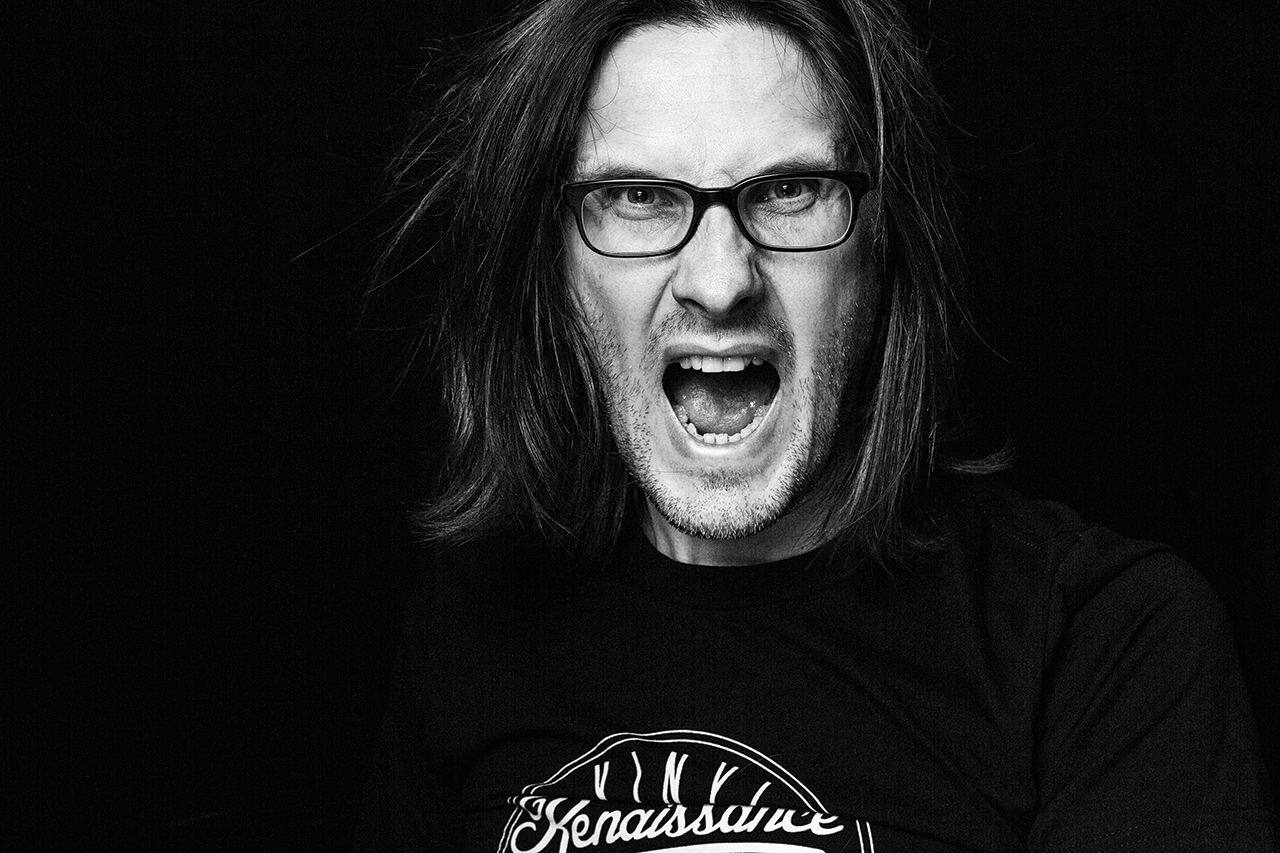Steven Wilson would like you to know something. He wants you to know that his new album, To The Bone, is a pop record. Now, to someone unschooled in prog, it doesn’t sound much like a pop album, in the contemporary sense – it sounds like an artful modern rock album with some pop touches. It sounds not unproggy a lot of the time, to be honest, but those who fly the prog banner need to be warned.
“I know pop is a very pejorative term,” Wilson says, sitting in the conservatory of his Hertfordshire home, looking Dorian Gray-ishly youthful for a 49-year-old. “Particularly when you’re talking with the prog audience. Pop is the sort of word they run screaming from. But I think of pop in the sense that Kate Bush is pop. Or The Beatles are pop. Or ABBA are pop. I’m not talking about the modern, very conservative pop scene; I’m talking about pop in the broad sense.”
You don’t need to know very much about Steven Wilson to know that he really doesn’t want to be pigeonholed as prog. It’s not that he dislikes prog, or is ashamed of prog – you don’t set about remixing the King Crimson catalogue, or make the music he does, if you feel that way – more that he recognises the grim reality: prog brings with it a set of associations in the wider public mind. Prog is male; it’s po-faced; it values technical excellence above melody; it’s self-indulgent; it’s best left undisturbed in its bedsit.
That’s all rubbish, Wilson accepts, and it masks the reality, which is that a lot of music no one would ever consider prog is actually perfectly prog, but because it doesn’t get lumbered with the label, it can reach a wider audience.

“If you listen to a band like Joy Division, for example, Closer is closer – pardon the pun – to progressive rock than it is to punk: the weighty lyrical subject matter about the human condition; the use of Mellotrons; the portentous, conceptual side of it; even the Peter Saville artwork – very pretentious, very humourless. It’s closer to In The Court Of The Crimson King than it is to The Damned.
“In the UK, things are put on one side or the other of the hip divide. My music does sound a bit more old-fashioned than Radiohead’s or Sigur Rós’. I do wear my love of people like Jeff Lynne and Yes a little bit more on my sleeve than those guys do. But at the same time, I do hear those things in the music of Radiohead and Sigur Rós and Muse, and it’s frustrating to me that they’re overlooked in their music but not in my music.”
As soon as people suggested Radiohead were prog, they took care to say they hated prog.
“Yeah, and I’ve always thought that was incredibly disingenuous of them. But, actually, I have to acknowledge that perhaps it was very wise.” [Ever contrary, Radiohead were also happy to give Prog magazine their only UK press interview back in 2009 – Ed.]
It’s not that Steven Wilson doesn’t love you or value you, prog fans. He’s very grateful for everything you’ve done for him. He just wishes some other people liked his music too.
“Here it is in a nutshell. Most people who would consider themselves to be music lovers have had the opportunity to decide whether they like Coldplay or not. They’ve had the opportunity to decide whether they like Radiohead or not. The frustration is that they haven’t had the chance to decide whether or not they like my music.”
And that’s because once you get called prog, you’re never going to get on the radio, into most of the music magazines, or into the newspapers.
Honestly, I’ll tell you one reason people don’t call Radiohead and Muse and Sigur Rós prog: they always took care to look like indie bands.
“You think it’s as simple as that?”
Not entirely. But partly.
“I look like a nerd, which probably doesn’t help. If I’d been wiser, I probably could have gone about cultivating my image in a different way.”
Steven Wilson was probably always destined to be a nerd. “My dad was an electronic engineer and he used to build me things,” he says. “He would have to invent them, because this was the 80s and you couldn’t just go on the internet and download a circuit diagram. So he’d figure out how to build me things.
“He built me a little four-track recorder, so at 12, 13 years old I was experimenting with multitracking. And he built me a sequencer. Except my dad wasn’t a musician, so he would always get something a little bit wrong. So the sequencer he built me was a nine-step sequencer. If he’d been a musician, he would have known that most music is in four, so he’d have built a four-step or an eight-step sequencer. He built me a nine-step sequencer because that was the number of relays he could afford.
“If I look back and try to intellectualise that, maybe that’s why I became so interested in strange time signatures, because everything I wrote with the sequencer had to be in three or nine, which are not common time signatures. It made me think about music in different ways, because I had to work around things.
“With the multitrack machine he built me, he couldn’t figure out how to get the erase head to work, so everything I had to do had to be a first take. And, again, if I rationalise that, maybe that’s why I became interested a little bit more in the idea of lo-fi and the role of chance in music.”
Rather than doing what most kids do – picking up an instrument, finding some mates who’ve got instruments, then bashing out enough cover versions in someone’s bedroom until they feel confident enough to perform in a local youth club or school assembly – Wilson was learning to be a producer. And that’s what he wanted to be. “I wanted to hold a record in my hand and say, ‘This is something I made.’ My first ambitions were to be in the studio all the time, and my dad – amazingly – facilitated that from an early age.”
Alongside that was a voracious interest in music – not just the prog giants, but the New Wave Of British Heavy Metal, Neil Young, Elton John, ABBA, Can, Tangerine Dream, ELO, Tubular Bells, The Dark Side Of The Moon, the Bee Gees, the Carpenters.
“But at the same time, and this is one of the things I’ve always struggled to explain to other people, I was fascinated by dark music. I was a very pretentious, pompous teenager, readings things like Franz Kafka’s In the Penal Colony and listening to Throbbing Gristle’s The Second Annual Report. Maybe it’s because I came from this very happy, loving family that I was fascinated by these things that were alien to me. I guess that’s part of the magic of pop music, presenting a world that you would never want to be a part of.”
- The TeamRock+ Singles Club
- Steven Wilson: "I have a strong personality and I don’t need to hide it anymore"
- Steven Wilson: In Praise of Nine Inch Nails' The Fragile
- TeamRock Radio app back on Apple’s app store
What he grew up with – and this feeds back to why he doesn’t want to be “Mr Prog” – was a sense that music was a journey, rather than a destination. That it could be everything, and should never just be one thing. And he mourns the loss of a conception of ‘pop’ that incorporates everything, rather than something that’s narrowly defined in the fashion of contemporary pop radio playlists.
We spend a moment discussing the wonder of BBC4’s repeats of Top Of The Pops, which by simply reflecting what happened to be in the charts at any given time, rather than ‘curating’ a view of what music should be, offer a fairly dizzying idea of 80s pop. You might get a terrible novelty record, some absurdly ambitious piece of New Pop, a heavy metal band and a disco hit all thrown at the screen, one after the other, not differentiated.
“The 80s get a bad rep,” Wilson says, “but it’s wonderfully mad when you see The Smiths alongside The Tweets on the same episode of Top Of The Pops, or Status Quo next to Echo And The Bunnymen. It’s all become so homogenised.”
So when he says To The Bone is a pop record, he doesn’t mean he’s trying to compete with Ed Sheeran. He means he’s trying to make a record that captures the spirit of adventure he remembers from some of the big acts of his teens: not a lowest common denominator but a higher plane of pop.
“I was completely besotted by artists like Kate Bush, Tears For Fears, Talk Talk, Prince, Depeche Mode, and what Peter Gabriel was doing in the 80s. What I loved about those records was that they were very accessible – you could enjoy them for the melodies – but at the same time, if you chose to engage with them at a deeper level, there were great lyrics about quite deep subject matter, and very ambitious, cinematic production, with great musicianship. And they were outside genre classification.
“So this is the first time I’ve really focused on my pop sensibility, stripping away some of the most conceptual elements and some of the more technical muso aspects, and just concentrating on the art of writing big, epic, ambitious pop music.”

All that said, you might be preparing yourself for Wilson’s fifth solo album to be entirely unrelated, utterly flippant three-minute songs. Don’t bother. That’s not what To The Bone is. While it might not be as obsessed with the darkness as its predecessor, Hand.Cannot.Erase., or as unconcerned with commercial possibility as previous iterations of Wilson’s career – Bass Communion, Blackfield, Continuum, Incredible Expanding Mindfuck, No-Man, Porcupine Tree, Storm Corrosion – it’s a weighty album, dealing with what has become the weightiest theme of all in the contemporary world.
“The album starts with this black American schoolteacher who’s a very good friend of mine, Jasmine, talking about the nature of truth and how truth has become a flexible notion,” he says. “Truth is something that’s filtered through everyone’s agenda, whether it’s your race, your religion, your politics. All the songs on the record are about truth and about the way people have different truths, whether it’s the religious fundamentalist or the terrorist or the politician.
“In the simplest sense, there are songs on the record about relationships and how two people in a relationship can have a completely different truth about the relationship, a different perspective. What we call truth is nothing of the sort a lot of the time. We have a perspective, and that becomes our truth. Truth, in the true sense of the word, is an absolute singular reality. But it seems to me you can never get to that singular absolute reality.”
The fascination with truth and what it is or isn’t is a result of what has happened in the world in the two-and-a-half years since Wilson wrote Hand.Cannot.Erase.. He had thought that offered a bleak enough view of the world, “but since then we’ve had Brexit, we’ve had Donald Trump, we’ve had the terrorists come right to our very doorstep, we’ve had Bataclan, we’ve had Manchester. I wouldn’t go so far as to say it would have been irresponsible not to write about those things, but it would have been strange if I hadn’t touched upon them.”
He thinks pop’s escapism has to have been challenged by what has happened in the world – when 22 people are murdered at the end of a mainstream pop show, how can it not be?
“This world has now come to them, and it’s affecting their young fans. Can they continue to completely pretend it’s not happening? It seems to me that we’ve forgotten that a lot of pop music came out of anger, and you could argue that was when it was at its best.”
But there’s sentiment there, too. Wilson has a history of getting heroes who worked on his old favourite albums in to recreate their roles for him – like getting Alan Parsons to serve as engineer on The Raven That Refused To Sing (And Other Stories) – and while he would doubtless argue it’s about getting the best person for the job, it’s hard not to think he’s indulging in wish fulfilment too. There’s another returning hero this time.
“Do you know those old Talk Talk and The The records from the 80s? Remember the harmonica? I tracked down the guy who was on all those records, Mark Feltham. It’s one of the first sounds you hear on the record. It’s such an amazing sound, and I think no one had looked at him for 20 years. It’s the Tarantino thing: ‘I don’t care if John Travolta’s out of fashion – I remember he was great, and I’m going to bring him back and make him hip again.’”
He considers what he’s said for a moment. “I don’t know if I’m making these people hip again. Probably not. But as soon as he started playing in the studio, people around were almost crying. It’s such an amazing sound.”
The sensible money would be against To The Bone being the album that makes a 49-year-old with a confoundingly dense and diverse discography into a mainstream star. But his exclusion from the mainstream baffles Wilson. At one point we have a 10-minute discussion on why I never commissioned an interview with him when I was music editor of The Guardian, despite the paper’s writers giving him good reviews (short answer: ‘bloke who’s made dozens of good records makes another good record’ isn’t much of a story to sell to people who’ve never heard of him).
But what I don’t understand is why it bothers him. He lives in a beautiful house. He sells out big theatres. His audience loves him. He gets to make the music he wants, without interference. In the end, he accepts, it boils down to something simple.
“I have a big ego, as most people that stand up in front of an audience on a stage do. You have to have a big ego. I would like my music to have some place in history. I would like it to have some immortality. And the more significant it is to the more people, the happier I’ll be.
“Maybe it’s self-validation. People look at me and say, ‘He’s made music. He’s not compromised. He’s got a good fan base and he sells lots of records.’ I’m not saying I feel like a failure, but I still don’t feel that sense of self-validation to the extent I’d like to. And yes, I look at people like Thom Yorke, and I think: ‘You fucker!’”
Steven Wilson isn’t bitter. He’s just devoted so much of his life to thinking about music, and the music industry, that he can’t quite see the wood for the trees. It’s easy for an outsider to point to the 629 albums recorded under 327 identities, to the concept albums and experiments, to the privacy he protects, and say: ‘Dude! You want to be a household name, and get in all the music mags? Just make one album every two years and tell people how unhappy you were making it, and how drunk you got every night to cope.’
But if he did that, he wouldn’t be Steven Wilson any longer. And what would be the point of that?
To The Bone is out on August 19 via Caroline International. For more information, see www.stevenwilsonhq.com.
Mixing It Up
Steven Wilson: master remixer
Alongside his career as a musician, Steven Wilson has become the go-to remixer for 5.1 surround sound remixes of classic albums. It’s amazing he finds the time, but as he explains, “I have a very strong work ethic.”
His list of remix credits is now vast, encompassing King Crimson, Yes, Jethro Tull and ELP, plus XTC, Simple Minds, Roxy Music and Tears For Fears. But how did this alternative career develop?
“The first album Porcupine Tree did for Atlantic [Fear Of A Blank Planet, in 2007], we were approached about doing a 5.1 surround sound mix, and I knew nothing about that. When I heard it, I thought, ‘I can do better than that.’ So I went out and invested in a 5.1 surround system, and I started mixing all of my music from that point in 5.1 surround sound. In 2011, The Incident got Grammy nominated, so I started to get some recognition for doing it. My manager at the time was also managing King Crimson, and he suggested, ‘Why don’t we ask Robert Fripp if he’s interested in having King Crimson mixed in surround sound?’
“I started to do the Crimson catalogue, and they were very, very well-received. And one door leads to another, and first other prog rock bands started to approach me – Jethro Tull, Yes – and then eventually some other artists started to cross over. I’m in the middle of doing the XTC catalogue now, I’m doing the Tears For Fears catalogue, so it’s beginning to broaden out.
“One of the reasons I think I’ve been quite successful is I’m extremely faithful. I don’t like the idea of ‘modernising’. What I’m trying to do is be as faithful as I can to the original mix, in almost every respect, even down to stereo placement. So if the guitar’s over there in the original mix, that’s where I’ll have it in mine. I’m not really changing any of the decisions that were made.
“A few weeks ago, a guy from Sony rang up and said, ‘We want you to do the New York Dolls in surround.’ I said: ‘No! It’s not the sort of album you want to do in surround.’ Not everything lends itself to surround. But the sort of albums that belong to my world, the progressive rock world, or those big, epic 80s records, they’re perfect for surround, because there’s so much sound design and there are all these layers going on.”
This article originally appeared in issue 79 of Prog Magazine.
Steven Wilson - To The Bone album review

